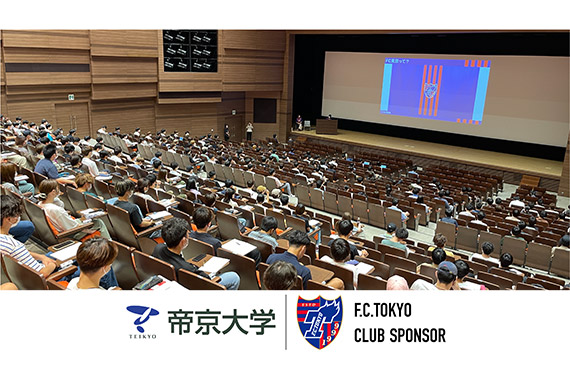
- 八王子キャンパス
経済学部 経営学科

- 八王子キャンパス

ビジネスの現場で生じる諸問題に
対処できる能力を養います
経営学科では、ビジネスの場で生起するさまざまな問題への対応能力を養うため、企業経営に関する基礎的理論への理解を深めるとともに、実践的課題に対処する専門的な知識やスキル、そして企業経営に要求されるコミュニケーション能力やリーダーシップ、倫理観を持った人材の育成を図っています。

アジア国際交流プログラム(TAEP)
経済学部では、日本とアジアの発展に貢献する人材の育成を目的に、帝京大学アジア交流プログラム(TAEP)を発足しました。現在、ホーチミン市外国語情報技術大学(ベトナム)、パンヤピワット経営学院(タイ)、ヤンゴン経済大学(ミャンマー)、ジェンデラル・スディルマン大学(インドネシア)、パニャサストラ大学(カンボジア)、アダムソン大学(フィリピン)、ラオス国立大学(ラオス)の各大学協定を結び、留学生を受け入れるなど交流プログラムを進めています。また、アジア交流プログラムの科目は複数用意されており、講義はすべて英語で行われます。

FC東京とのクラブスポンサー契約
東京フットボールクラブ株式会社が運営するJリーグクラブ「FC東京」とクラブスポンサー協賛に関して契約を締結しています。FC東京クラブスタッフによる講義を実施し社会連携活動に関する取り組みや、スポーツビジネスを学ぶ機会の提供、試合運営の様子やスタジアムの見学・仕事体験等を行います。本学科においてもより最前線のリアルなビジネス現場を理解する一助になると考えています。

企業経営に必要な専門知識を効果的に学びます。経営についての基礎科目はもちろん、財務および労務管理や企業戦略、ベンチャー・ビジネス論など、多彩な分野を学習します。卒業後は、本学大学院でMBAを取得することもできます。

企業の経営的・財務的基盤の理解をはじめ、記帳管理などの実務面、財務諸表の作成や見方など、企業と会計の基礎から応用までを学びます。卒業後も学びたいという学生のために、本学大学院で税理士をめざす道も用意されています。

経営全般を学びながら、スポーツ経営にかかわる多彩な分野について理解を深めます。卒業後は、プロスポーツ経営だけでなく、スポーツ関連を含む一般企業、公務員として企業の活性化や街おこしなどにも力を発揮できます。
1、2、3年次で必修となる演習では、少人数教育を通じてプレゼンテーションやコミュニケーションの能力、問題解決能力を育成します。また基礎科目の履修により基礎的経営理論を修得するとともに、入学後に選択できる「経営」「企業と会計」「スポーツ経営」の3コースで企業経営の現実の諸問題を明らかにし、これに対処できる能力を養います。
経営学総論
学問としての経営学を、高等学校までで学んだことがある人はほとんどいないと思います。そのため、中には経営学をお金儲けのための学問であるとか、経営者のための学問と思っている人がいるかもしれません。このような捉え方は正しくもあり、間違ってもいます。もちろん、経営学はお金儲けにも使えますし経営者の役にも立ちます。しかし、その枠に収まらないのが経営学の本当の姿なのです。現代の経営学は、営利目的の企業経営のみならず、医療経営や学校経営など、さまざまな事業体の経営に活用されています。また、会社経営者のみならずさまざまな人たちに役立つ学問となっています。経営学総論の授業では、このような経営学の基本的な用語の解説から、管理や組織、戦略を中心にわかりやすくていねいに解説していきます。
リスクと保険
本授業の領域は、経営リスクのみならず、金融リスク、法務リスク、自然災害リスク、オペレーショナルリスクなど、社会科学から自然科学まで多岐にわたっています。そのため、学問のグランドデザインを学ぶには最適な科目であると言えます。企業経営とはリスクを取ることですが、経営者にはリスクの適正な計測と適切なマネジメントが求められます。同時にそのリスクに見合ったリターンの追求がなければ企業の存続はあり得ません。この授業では、まずリスクの引受主体である損害保険、生命保険、社会保険などの多種多様な保険分野に共通する基本的事項を理解します。次に保険の供給者である保険会社の経営の仕組みと特徴を学習します。さらに企業を取り巻くリスクの対処方法として現実に行われている「企業経営のトータルリスク管理」を学びます。本授業を通して、実学に基づいた経営手法を皆さんと一緒に考えたいと思います。
簿記原理
本授業では、企業活動を記録する際に用いられている複式簿記について学習します。大学で初めて簿記に接する学生が多いと思いますが、簿記原理では初めて簿記について学ぶ学生を前提として、前期では複式簿記の基本的な考え方を学びます。後期では、前期に学習した複式簿記の基本的な考え方を前提として、会計学とのつながりを意識しながら個々の具体的な簿記処理について学びます。また、簿記にはいくつかの検定試験があります。簿記を学習する魅力の1つとして、資格の取得に直結することが挙げられます。もちろん資格の取得それ自体が目的ではありませんが、勉強して身につけた自分の力を試す良い機会ですので、検定試験の受験を推奨しています。簿記原理の授業の中でも、過去に出題された簿記の検定試験の過去問などを取り扱い、資格取得に向けた勉強も並行して行っています。
アメリカ型スポーツ経営
アメリカで絶大な人気を誇るアメリカンフットボール、ベースボール、バスケットボール、アイスホッケー。そのパフォーマンスとエンターテインメント性もさることながら、プロスポーツビジネスとしてもアメリカ経済を牽引しています。本授業では、これら4大スポーツのプロリーグであるNFL、MLB、NBA、NHLを中心に取り上げ、その歴史、経営理念、ビジネスモデルと戦略などを解説し、アメリカスポーツ経営の基礎知識を学びます。時代背景や市場変化の中、今も成長を遂げるアメリカスポーツ市場。今後も高度化するスポーツパフォーマンス、地域に根づくフランチャイズ制など、わが国のスポーツ環境と比較検証しながら、世界最高峰のスポーツビジネスモデルを学びます。また、現地アメリカでのビジネス視察研修ツアーも実施し、本場のプロスポーツビジネスを体感し、スポーツ産業の幅広さを実感することで次代を担う人材の育成をめざします。
マーケティング
ニーズに応えて利益を上げること。著名なマーケティング研究者であるフィリップ・コトラーは、マーケティングの本質をこのように表現しています。マーケティングというと市場調査や販売促進をイメージされることが多いですが、顧客にとっての価値を創造し、ニーズを充足させるための活動はすべてマーケティングであると言えます。この授業では、マーケティングに関するさまざまな課題や枠組みについて、企業の事例を交えながら解説しています。また、事例に基づいたマーケティング課題を提示し、学生に意見を発言してもらいながら進めることもあります。たとえば、価格をテーマにした回では、2014年4月に行われた牛丼チェーン各社の価格変更の事例を取り上げて「もしあなたがX社の責任者だったら牛丼をいくらに設定するか」という課題について議論しました。授業を通して、学生には企業のビジネス活動をマーケティングの視点で分析できるようになってほしいと思っています。
GPA(Grade Point Average)制度の導入の趣旨は、1. キャンパスとして統一した基準を作成すること、2. 公平性に優れた基準であること、3. 国際的に通用する基準であることとし、学修の成果をGPAという客観的な数値で評価するものです。またこの制度は、欧米の大学で採用されている成績評価制度に概ね準拠しており、海外留学、海外の大学院進学、外資系企業への就職などの際に学力を証明する指標として、海外でも通用する成績評価制度となっています。
| 区分 | 評価 | GPA | 成績評価基準 | 評価内容 | 英文内容 |
|---|---|---|---|---|---|
| 合格 | S | 4.0 | 90点以上 | 特に優れた成績を表します | Excellent |
| A | 3.0 | 80点台 | 優れた成績を表します | Good | |
| B | 2.0 | 70点台 | 妥当と認められる成績を表します | Satisfactory | |
| C | 1.0 | 60点台 | 合格と認められる最低限の成績を表します | Pass | |
| 不合格 | D | 0.0 | 60点未満 | 合格と認められる最低限の成績に達していないことを表します。また、授業等の出席日数不足および当該授業における試験の未受験等も含みます | Failure |
| 対象外 | N | - | - | 編入や留学等により他大学等で修得した科目を本学の単位として認定したことを表します(単位認定科目) | Credits Transferred |

| 科目区分 | 必修・選択の例 | 所要単数 | |||||
|---|---|---|---|---|---|---|---|
| 共 通 教 育 科 目 ※4 | 教養 教育科目 | 人文科学系分野 | 選択必修 | 2以上 | 8以上 | 30※1 | |
| 社会科学系分野 | 2以上 | ||||||
| 自然科学系分野 | 2以上 | ||||||
| 文理融合分野 | 選択 | - | |||||
| 初年次 教育科目 | ライフデザイン演習Ⅰ・Ⅱ | 必修 | 2 | ||||
| キャリア 教育科目 | キャリア入門 | 必修 | 2 | ||||
| 情報教育科目 | 選択必修 | 2 | |||||
| 外国語 教育科目 | 現代英語Ⅰ・Ⅱ | 必修 | 4 | ||||
| 実用英語Ⅰ・Ⅱ | |||||||
| 専門科目※4 | 必修 | 8 | 74※3 | ||||
| 選択 必修※2 | 展開・ 総合科目 | 4 | |||||
| 経済学部 入門科目 | 16 | ||||||
| 基礎 科目A | 12 | ||||||
| 基礎 科目B | 8 | ||||||
| 選択 | 26 | ||||||
| 自由選択 | ・専門科目74単位の超過単位 ・共通教育科目30単位の超過単位 ・オープン科目の修得単位 ・副専攻プログラムの修得単位 ・他大学での認定単位 | 選択 | 20 | ||||
| 合計 | 124 | ||||||